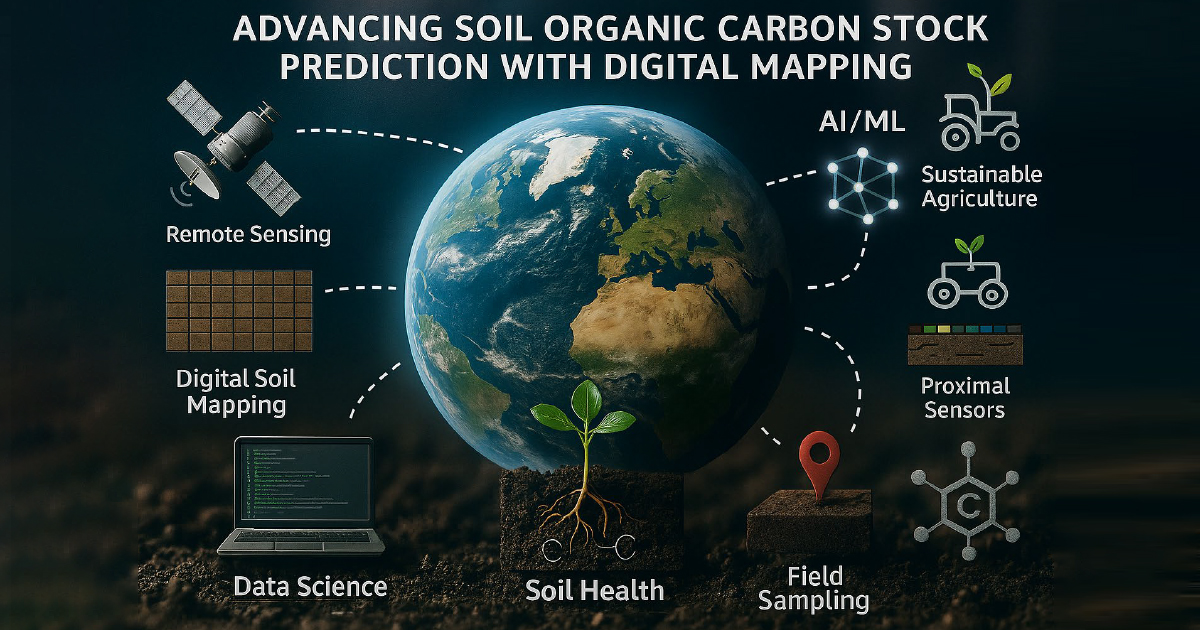- 3.6Impact Factor
- 6.3CiteScore
- 19 daysTime to First Decision
Advancing Soil Organic Carbon Stock Prediction with Digital Mapping
This special issue belongs to the section “Artificial Intelligence and Digital Agriculture“.
Special Issue Information
Dear Colleagues,
Soil Organic Carbon (SOC) plays a pivotal role in global climate regulation, soil fertility, and sustainable agriculture. As the largest terrestrial carbon pool, SOC is central to international climate goals and nature-based solutions. In recent years, considerable efforts have been made to improve the spatial prediction and monitoring of SOC stocks, enabling more accurate carbon accounting and land management strategies.
This Special Issue aims to gather cutting-edge research on innovative approaches for mapping and evaluating SOC stocks at multiple spatial and temporal scales. We welcome contributions that advance Digital Soil Mapping (DSM) techniques, integrate remote and proximal sensing data, and explore machine learning and deep learning applications in SOC prediction. Interdisciplinary studies that incorporate microbiology, spectroscopy, land use dynamics, and novel monitoring frameworks (e.g., MRV systems) are especially encouraged.
We are particularly interested in studies addressing persistent challenges in SOC mapping, such as data scarcity, uncertainty quantification, harmonization across regions, and underrepresentation of vulnerable ecosystems. Contributions that propose scalable, transparent, and policy-relevant solutions are essential to support soil-centered climate actions and sustainable land use transitions.
Original research articles, reviews, methodological papers, and case studies are all welcome.
Prof. Dr. Raul Roberto Poppiel
Dr. Nikolaos Tziolas
Guest Editors
Manuscript Submission Information
Manuscripts should be submitted online at www.mdpi.com by registering and logging in to this website. Once you are registered, click here to go to the submission form. Manuscripts can be submitted until the deadline. All submissions that pass pre-check are peer-reviewed. Accepted papers will be published continuously in the journal (as soon as accepted) and will be listed together on the special issue website. Research articles, review articles as well as short communications are invited. For planned papers, a title and short abstract (about 250 words) can be sent to the Editorial Office for assessment.
Submitted manuscripts should not have been published previously, nor be under consideration for publication elsewhere (except conference proceedings papers). All manuscripts are thoroughly refereed through a single-blind peer-review process. A guide for authors and other relevant information for submission of manuscripts is available on the Instructions for Authors page. Agriculture is an international peer-reviewed open access semimonthly journal published by MDPI.
Please visit the Instructions for Authors page before submitting a manuscript. The Article Processing Charge (APC) for publication in this open access journal is 2600 CHF (Swiss Francs). Submitted papers should be well formatted and use good English. Authors may use MDPI's English editing service prior to publication or during author revisions.
Keywords
- soil organic carbon (SOC)
- digital soil mapping (DSM)
- remote sensing
- proximal sensing
- machine learning
- deep learning
- SOC monitoring, reporting and verification (MRV)
- spectroscopy
- soil health and climate change
- spatial prediction of SOC

Benefits of Publishing in a Special Issue
- Ease of navigation: Grouping papers by topic helps scholars navigate broad scope journals more efficiently.
- Greater discoverability: Special Issues support the reach and impact of scientific research. Articles in Special Issues are more discoverable and cited more frequently.
- Expansion of research network: Special Issues facilitate connections among authors, fostering scientific collaborations.
- External promotion: Articles in Special Issues are often promoted through the journal's social media, increasing their visibility.
- e-Book format: Special Issues with more than 10 articles can be published as dedicated e-books, ensuring wide and rapid dissemination.

